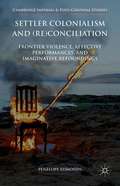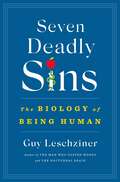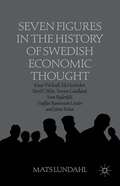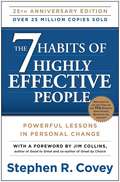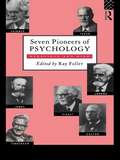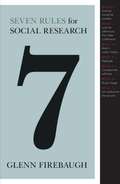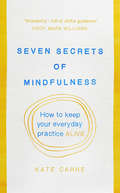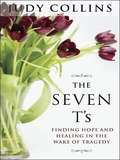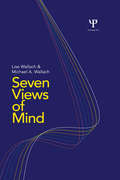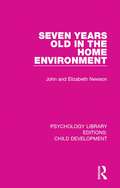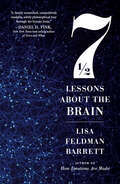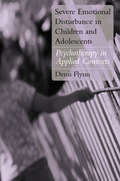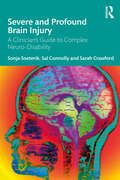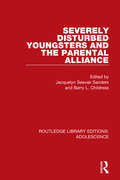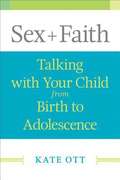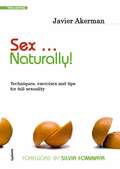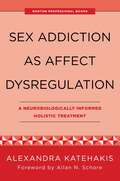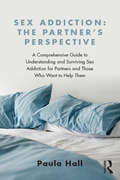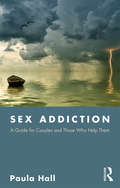- Table View
- List View
Settlement, society and cognition in human evolution
by Francis Wenban-Smith Fiona Coward Robert Hosfield Matt PopeThis volume provides a landscape narrative of early hominin evolution, linking conventional material and geographic aspects of the early archaeological record with wider and more elusive social, cognitive and symbolic landscapes. It seeks to move beyond a limiting notion of early hominin culture and behavior as dictated solely by the environment to present the early hominin world as the outcome of a dynamic dialogue between the physical environment and its perception and habitation by active agents. This international group of contributors presents theoretically informed yet empirically based perspectives on hominin and human landscapes.
Settler Colonialism and: Frontier Violence, Affective Performances, and Imaginative Refoundings (Cambridge Imperial and Post-Colonial Studies)
by Penelope EdmondsThis book examines the performative life reconciliation and its discontents in settler societies. It explores the refoundings of the settler state and reimaginings of its alternatives, as well as the way the past is mobilized and reworked in the name of social transformation within a new global paradigm of reconciliation and the 'age of apology'.
Seven Chakras of Leadership: How to Create a Holistic Workplace
by Zohra Damani Neal A. BakshiSeven Chakras of Leadership is a transformative guide for leaders seeking to align their inner energy with their professional impact. It connects ancient wisdom with modern leadership science, offering a powerful framework for navigating the complexities of today’s workplace while staying grounded in authenticity and purpose.At the book’s core is the concept of The Journey—a practice inspired by Shamanism, inviting leaders to explore their inner world and align their energy centers, or chakras, to unlock their fullest leadership potential. The authors provide actionable tools rooted in ancient traditions—such as meditation, breathwork, energy healing, and chakra alignment—tailored to the demands of modern leadership. Using the chakra system as a framework, the book maps each chakra (root, sacral, solar plexus, heart, throat, third eye, and crown) to critical aspects of leadership development. By linking chakra principles to evidence-based practices such as emotional intelligence, mindfulness, and transformational leadership, leaders will gain practical insights into how balancing their energy centers can enhance decision-making, foster resilience, and improve team dynamics. Addressing both the empowering and shadow aspects of these energy centers, the book equips leaders with practical tools, reflective exercises, and action steps to navigate challenges, build self-awareness, and drive meaningful transformation in their organizations.With templates for energy management and chakra assessment, whether you’re a corporate executive, manager, or entrepreneur, this book equips you with practical strategies to balance your inner compass and develop conscious, compassionate leadership.
Seven Deadly Sins: The Biology of Being Human
by Dr. Guy LeschzinerA FINANCIAL TIMES BEST BOOK OF THE YEARSeven Deadly Sins will explore the underlying nature of the seven deadly sins, their neuroscientific and psychological basis, and their origin in our genes.Gluttony. Greed. Sloth. Pride. Envy. Lust. Anger. These are The Seven Deadly Sins, the vices of humankind that define immorality. But do these sins really represent moral failings, or are they simply important and useful biological functions that humans need to survive? Instead of being acts of immorality, are they really just a result of how our bodies, our psyches, and our brains in particular, are wired? In Seven Deadly Sins: The Biology of Being Human, Guy Leschziner, a professor of neurology, dares to turn much of what society thinks of as morality on its head and to ask these controversial questions.Leschziner takes readers on an exploration of the Seven Deadly Sins as he looks at their neuroscientific and psychological bases, their origin in our genes, and, crucially, how certain medical disorders may give rise to them. He introduces us to patients whose physical and psychological conditions have given rise to behaviours that have for centuries been labelled as “sin” and how these behaviours might actually be evolutionary imperatives that preserve the tribe and ensure the wellbeing of our societies. In Seven Deadly Sins, a book certain to cause debate and raise controversy, Guy Leschziner, a writer who has explored the mysteries of our sleeping brains and the odd crossed wires of our five senses, asks whether these traits truly represent sin, or simply reflect our intrinsic drive to survive and thrive.
Seven Figures in the History of Swedish Economic Thought
by Mats LundahlWho are the greatest economic thinkers of Sweden? Seventeen essays on seven Swedish economists aim to answer this question, exploring the contributions of Knut Wicksell, Eli Heckscher, Bertil Ohlin, Torsten G#65533;rdlund, Sven Rydenfelt, Staffan Burenstam Linder and Jaime Behar. Swedish academic economists have by and large withdrawn from the public debate but this book celebrates Swedish Economic Thought from Knut Wicksell to the present.
Seven Habits of Highly Effective People: Powerful Lessons in Personal Change
by Stephen R. CoveyOne of the most inspiring and impactful books ever written, The 7 Habits of Highly Effective People has captivated readers for 25 years. It has transformed the lives of Presidents and CEOs, educators and parents— in short, millions of people of all ages and occupations.
Seven Pioneers of Psychology: Behaviour and Mind
by R. FullerIn this exciting new volume, six of the world's leading scholars write about the contribution made to our understanding of human behaviour and the human mind by seven great figures of the last 100 years: Lorenz and Tinbergen, Skinner, Piaget, Freud, James and Galton. Their seminal work on ethology, behaviourism, child development, psychoanalysis, perception and heredity provide the basis for much of today's psychological thinking and research. An account of the thought of each key figure is given together with a brief biography. Each contribution is written so that is can be understood by anyone interested in ideas of these major figures. Based on a series of lectures given at Trinity College, Dublin, Seven Pioneers of Psychology provides a clear, accessible and extremely readable account of seven of the great pioneers in exploring the human condition.
Seven Pleasures: Essays on Ordinary Happiness
by Willard SpiegelmanSpiegelman takes a look at the possibilities for achieving ordinary happiness without recourse to either religion or drugs. In this erudite and frequently hilarious book of essays, he discusses seven activities that lead naturally and easily to a sense of well-being.
Seven Principles of Good Government: Insights from the 2012 Libertarian Party Nominee for President
by Gary JohnsonGary Johnson is the former two-term governor of New Mexico. He made headlines during his tenure as governor for supporting school vouchers, a freeze on all taxes, real cuts in government agency funding and the decriminalization of marijuana. In 2012, he is running for President of the United States on the Libertarian Party ticket. He will be campaigning aggressively through the fall in all 50 states.
Seven Rules for Social Research
by Glenn FirebaughSeven Rules for Social Research teaches social scientists how to get the most out of their technical skills and tools, providing a resource that fully describes the strategies and concepts no researcher or student of human behavior can do without. Glenn Firebaugh provides indispensable practical guidance for anyone doing research in the social and health sciences today, whether they are undergraduate or graduate students embarking on their first major research projects or seasoned professionals seeking to incorporate new methods into their research. The rules are the basis for discussions of a broad range of issues, from choosing a research question to inferring causal relationships, and are illustrated with applications and case studies from sociology, economics, political science, and related fields. Though geared toward quantitative methods, the rules also work for qualitative research. Seven Rules for Social Research is ideal for students and researchers who want to take their technical skills to new levels of precision and insight, and for instructors who want a textbook for a second methods course. The Seven Rules There should be the possibility of surprise in social research Look for differences that make a difference, and report them. Build reality checks into your research. Replicate where possible. Compare like with like. Use panel data to study individual change and repeated cross-section data to study social change. Let method be the servant, not the master.
Seven Secrets of Mindfulness: How to keep your everyday practice alive
by Kate Carne'WONDERFUL...FULL OF SKILFUL GUIDANCE...A LIFELINE' Prof Mark WilliamsMindfulness remains as popular as ever. Yet those who are drawn to it may face challenges such as lack of time, physical pain, anxiety, depression or uncertainty. In this ground-breaking book, Kate Carne shows how to deal with the many problems that can arise, and offers practical solutions to help you overcome obstacles and deepen your practice. Combining personal stories, grounded advice and insights drawn from Kate Carne’s own professional and personal experience, as well as the experience of the many people she has taught over the years, this unique book is essential reading for anyone who has ever been drawn to mindfulness, but who – in spite of the best of intentions – finds themselves struggling to keep going after their initial enthusiasm has waned.
Seven Steps to Heaven: How to Communicate with Your Departed Loved Ones in Seven Easy Steps
by Joyce KellerSay Good-bye One More Time Have you ever experienced a breeze in a closed room? A brush on the cheek when no one is there? A whisper that sounds like the voice of someone who has passed away? Perhaps it is coincidence or perhaps it is the beginning of spirit communication. In Seven Steps to Heaven noted psychic Joyce Keller clears up misconceptions about the afterlife and reveals the various ways in which those who have crossed over make contact with us. With clarity and compassion she shares for the first time her successful Connection Technique that makes it possible for anyone to bridge the divide between the living and the dead. Developed over a period of twenty years, Keller's Connection Technique involves seven simple and safe tools: angels and spirit teachers prayer and affirmations meditation dreams a spirit space sound a labyrinth Seven Steps to Heaven offers comfort and hope to everyone who has experienced the profound loneliness and sadness that comes with the death of a family member, a dear friend, or a pet.
Seven T's, The
by Judy CollinsDrawing on her own experience of losing her son to suicide, as well as her conversations with hundreds of people who have grieved the tragic death of a friend or family member, revered singer-songwriter Judy Collins has culled 7 powerful steps toward healing: Truth (tell it), Trust (allow it), Therapy (get it), Treasure (hold on to your loved one), Thrive (look up and don¿t give in to the temptation to use alcohol or any other addiction to blunt your sadness), Treat (nurture yourself), and Transcend (live a life of joy, abundance, and forgiveness). Bill Moyers praises this book: ¿There is no return from the depths of grief that does not begin with the truth. Judy has written a book that will light the way back for any who take her hand and sing with her in the dark. ¿
Seven Views of Mind
by Lise Wallach Michael A WallachA CHOICE Outstanding Academic Title 2013! This book examines seven different answers to the question, "What are we talking about when we talk about the mind?" It begins by considering the dualistic view, frequently taken for granted by students, that words like "belief," "anger," and "jealousy" refer to a realm quite distinct from the physical world, and notes the difficulties associated with this view as well as why many find it compelling. The book then describes six further major views of mind alternative to dualism that have been developed by psychologists, philosophers, and neuroscientists: Some claim that such words are just about behavior. Some claim that such words are theoretical constructs, like "quarks" in physics. Some identify the mind with the brain or with a kind of program in the brain like the software in a computer. Some think there is nothing to which such words refer. Some think mental talk reflects nothing but convention. Students in psychology learn about different views of mind in various courses, but they tend to be left on their own to deal with the conflicts among them. How to conceive of mind is usually addressed in the context not of psychology but of philosophy, where it tends to be treated in ways that may seem esoteric to psychology students. Seldom discussed in one place, this book presents all seven views and the reasons for and against each in a relatively nontechnical, informal manner designed to appeal to psychology students and their instructors, permitting comparisons and possible resolutions.
Seven Years Old in the Home Environment (Psychology Library Editions: Child Development #9)
by Elizabeth Newson John NewsonJohn and Elizabeth Newson’s long-term investigation of child up-bringing attracted intense interest from its earliest beginnings: ‘pathbreaking’ and ‘seminal’ were adjectives that greeted their first report. The study is now established as one of the major projects of the seventies. This third volume of the series catches some seven hundred Nottingham children at a critical stage of their development: in transition from infant to junior school, they are moving out of the protective family orbit and into the wider social world of street, playground and classroom, where cultural pressures make themselves felt in ever more demanding ways. Like the Newson’s earlier books, this study has a strong ecological flavour in the sense that what children do, what parents do, and how they feel about what they do, are all set firmly into the broader context of life as it is lived in contemporary urban society. This is no laboratory investigation. Yet a sensitive and subtle methodology has allowed the Newsons to present an impressive structure of hard factual data, while putting flesh on the statistical bones by constant reference to the mothers’ own thoughts and reactions, faithfully recorded in their own vivid words. The result is a rich descriptive picture of seven-year-olds and their family life: their play, friendships, quarrels; their duties and privileges; their fears, fantasies and jokes. Inevitably, much of the book explores the dynamics of conflict between mother and child, and takes a long hard look at the domestic power-game as it is expressed in both words and punishment. At the same time, the loving and caring side of the relationship is closely and delicately examined with a rare empathy for both parent and child. In short, this is a study in depth and in breadth of how parents and children bring each other up. Teachers, doctors, nurses and social workers, as well as parents welcomed the Newsons’ earlier reports. Once again, no professional worker in the field of childhood or parenthood can afford to be without the insights offered by this volume, which is also a rich source of enjoyment for any observer, professional or amateur, of the family in society today. Today it can be enjoyed in its historical context.
Seven and a Half Lessons About the Brain
by Prof. Lisa Feldman BarrettFrom the author of How Emotions Are Made, a myth-busting primer on the brain in the tradition of Seven Brief Lessons on Physics and Astrophysics for People in a Hurry. Have you ever wondered why you have a brain? Let renowned neuroscientist Lisa Feldman Barrett demystify that big gray blob between your ears. In seven short essays (plus a bite-sized story about how brains evolved), this slim, entertaining, and accessible collection reveals mind-expanding lessons from the front lines of neuroscience research. You'll learn where brains came from, how they’re structured (and why it matters), and how yours works in tandem with other brains to create everything you experience. Along the way, you’ll also learn to dismiss popular myths such as the idea of a &“lizard brain&” and the alleged battle between thoughts and emotions, or even between nature and nurture, to determine your behavior. Sure to intrigue casual readers and scientific veterans alike, Seven and a Half Lessons About the Brain is full of surprises, humor, and important implications for human nature—a gift of a book that you will want to savor again and again.
Severe Domestic Squalor
by John Snowdon Graeme Halliday Sube BanerjeeShould you intervene in the life of the 48-year-old woman whose dwelling is stuffed with accumulated rubbish and who will not let anyone help get rid of it - or the 78-year-old surrounded by putrescent food and filth - or the 'animal accumulator'? Cases of severe domestic squalor (sometimes called Diogenes Syndrome) are among the most complex and difficult faced by community agencies. Local councils, housing officers, health professionals, social services, animal welfare agencies, public guardians and of course relatives and neighbours often feel powerless and lack confidence about what to do when faced with such situations. The guidelines, recommendations and case examples in Severe Domestic Squalor will help concerned people to understand what can be done and how, by providing an understanding of the causative factors and who should take the lead in dealing with them.
Severe Emotional Disturbance in Children and Adolescents: Psychotherapy in Applied Contexts
by Denis FlynnSevere Emotional Disturbance in Children and Adolescents conveys the experiences of severely emotionally disturbed children in detailed accounts of psychoanalytic psychotherapy, and explores the life and death struggles against severe self-harm to body and mind by the most distressed sections of adolescents. Illustrated by clinical material, chapters cover subjects including:* the inpatient therapeutic setting* family rehabilitation after physical, sexual and emotional abuse* the adoptive father* work with adolescent inpatients with spina bifida* assessment, treatment and clinical management of adolescent disturbance. Severe Emotional Disturbance in Children and Adolescents underlines the value of intensive psychoanalytic psychotherapy as a coherent method of treatment in even the most severe cases of emotional disturbance. Psychotherapists, mental health workers, and social workers will find it a valuable resource for difficult work in a variety of contexts.
Severe and Profound Brain Injury: A Clinician’s Guide to Complex Neuro-Disability
by Sonja Soeterik Sal Connolly Sarah CrawfordSevere and Profound Brain Injury is a comprehensive guide offering clinicians practical tools, techniques, and ways to structure thinking in approaching how to best assess and provide neurorehabilitation to patients with the most overwhelming and complex neuro-disability. Advances in acute care will lead to increasing numbers of people surviving with complex neuro-disability and more families will be challenged by a confusing and devastating form of loss. Most clinicians will not have encountered this level of impairment in clinical practice and can feel deskilled, challenged by how best to help, and overpowered by the questions it raises. This book proposes a paradigm shift in how to assess and formulate the cognitive, behavioural, and emotional difficulties in complex neuro-disability. The task for clinicians is to look for ability in the face of global impairment, rather than focus on areas of disability. Practical advice is provided on how to approach thinking about the issues and design bespoke, person-centred assessments from first principles with robust methodology. Prolonged disorders of consciousness and locked in syndrome are discussed in detail. Guidance is given to keeping the person at the centre of decision-making and intervention planning, particularly as so many will lack mental capacity and require best interests’ decisions to be made on their behalf. This is essential reading for established clinicians wanting to develop expertise working with these patients and their families, clinical psychologists, neuropsychologists, other health professionals, students, and trainees.
Severely Disturbed Youngsters and the Parental Alliance (Routledge Library Editions: Adolescence #8)
by Jacquelyn Sanders Barry ChildressOriginally published in 1992 this was a much-needed book that shows how important it is to establish a therapeutic alliance with the parents of severely disturbed young people in order to improve the success of counseling with them. It also explores methods of how to ease the difficulties encountered in establishing such a relationship with the parents or guardians. In this title, the insights of psychoanalysis are used to understand reactions to parents and to develop an empathic approach to them through a new theoretical framework. Although in the popular view, a psychoanalytic approach is considered to be opposed to parents, this volume is testimony to the unique contribution such an approach can make to the support of parents and, thereby, their children. A major and unique emphasis of Severely Disturbed Youngsters is placed on exploring the feelings, reactions, and sensitivities of the therapist that can interfere with this important aspect of treatment. The thrust of the book is to put the understanding of this interference in a theoretical context and to indicate ways of coping with the interference.
Sex + Faith
by Kate OttTalking with your child about sex can be scary! Sex + Faith helps parents incorporate their faith values with sexual information so they can answer questions, discuss sexuality at each stage of childhood, and show support of sexual differences. Section one explains how faith relates to sexuality and the essential role parents play in forming healthy, faithful, sexual children . The second section designates a chapter for four age groupings of children from infancy through high school. Each chapter explains the biological and developmental issues of the age, answers questions children tend to have, provides relevant Biblical and faith stories helpful to discuss with children of that age, and lists five to ten key educational issues for parents to keep in mind. Shaded text boxes are interspersed throughout the book with real life, practical questions that parents and children ask. Expertly written by Kate Ott, Sex + Faith is an easy to use reference guide for parents of kids of all ages.
Sex ... Naturally!
by Javier AkermanIn this work, among others, you will know: How to make organic sex toys. How to get the most out of tantric sex. Kama-Sutra for Westerners. Food and meals to enhance sexual desire. Male and female masturbation techniques. Gym-sex, gymnastics to enhance sexuality. How to avoid STDs. Keys to understanding sex in all ages. “Javier Ajerman has known how to include in Sex … Naturally!” all the components that make this work a practical, entertaining manual full of advice that will delight the reader, in the literal sense of the word. It has surprised me, I assure you, at the same time that it has made me smile in many chapters, because sex and laughter are, in the author’s words “a sure path to shared happiness.” Said Silvia Fominaya on the prologue.
Sex Addiction as Affect Dysregulation: A Neurobiologically Informed Holistic Treatment (Norton Series On Interpersonal Neurobiology Ser. #0)
by Alexandra KatehakisExamining the neurobiological underpinnings of sex addiction. Neuroaffective science—studying the integrated development of the body, brain, and mind—has revealed mechanisms linking psychological and biological factors of mental disorders, including addiction. Indeed, its paradigm-shifting theoretical umbrella demonstrated that substance and behavioral dependencies share identical neurobiological workings, and thus that problematic repetitive behaviors are genuine addictions—a state increasingly understood as a chronic brain disorder. Clinical experience strongly suggests that sex addiction (SA) treatment informed by affective neuroscience—the specialty of Alexandra Katehakis—proves profoundly transformative. Katehakis's relational protocol, presented here, blends neurobiology with psychology to accomplish full recovery. Her Psychobiological Approach to Sex Addiction Treatment (PASAT) joins therapist and patient through a relationally-based psychotherapy—a holistic, dyadic dance that calls on the body, brain, and mind of both. Written with clarity and compassion, this book integrates cutting-edge research, case studies, verbatim session records, and patient writings and art. Katehakis explicates neurophysiological, psychological, and cultural forces priming and maintaining SA, then details how her innovative treatment restores patients' interpersonal, sexual, and spiritual relationality.
Sex Addiction: A Comprehensive Guide to Understanding and Surviving Sex Addiction For Partners and Those Who Want to Help Them
by Paula HallSex and pornography addiction are growing problems that devastate the lives of partners as well as sufferers. Sex Addiction: The Partner's Perspective has been written to help partners and those who care about them to survive the shock of discovering their partner is a sex addict and to help them make decisions about the future of their relationships and their lives. First and foremost, it is a practical book, full of facts, and self help exercises to give partners a much needed sense of stability and control. Like its sister book, Understanding and Treating Sex Addiction, it includes case examples and survey results revealing the reality of life for partners of sex addicts. Sex Addiction: The Partner's Perspective is divided into three parts. Part I explores the myths surrounding sex addiction and provides up to date information about what sex addiction is and what causes it before moving on to explain why the discovery hurts partners so much. Part II is about partners’ needs and includes self-help exercises and strategies to help partners regain stability, rebuild self-esteem and consider their future. The controversial topic of co-dependency is also explored with guidance on how to identify it, avoid it and overcome it. Part III focuses on the couple relationship starting with the difficult decision of whether to stay or leave. Whatever the decision, partners will then find help and support for rebuilding trust and reclaiming their sexuality. This book has been written to help partners not only survive, but to grow stronger and move on with their lives – whether alone, or in their relationship. Readers will find revealing statistics and real life stories shared by partners who kindly took part in the first UK survey of sex addiction partners. This book will this book be a valuable guide for partners, but also for the therapists who seek to support them on their journey of recovery.
Sex Addiction: A Guide for Couples and Those Who Help Them
by Paula HallSex Addiction: A Guide for Couples and Those Who Help Them is a practical book that provides empathic support, guidance, information and pragmatic strategies for couples who want to survive sex and porn addiction - whether that’s together, or apart. Sex and porn addiction devastates couple relationships, and unlike the impact of infidelity, there is no ‘before’ to get back to and no ‘after’. This book adopts the metaphor of a boat, presenting addiction as the tidal wave that devastates the relation-ship, leaving both crew members fighting for survival. There’s guidance to ensure each partner makes it safely back to shore and advice on surveying the damage to your relation-ship and deciding if you want to save it and set sail again. You’ll find practical advice for both the partner and the addicted partner, including first-hand accounts of couples that have already undertaken the journey. There are exercises to do alone, and many to share together, to help you understand what’s happened, consider your future, and if you choose to stay together, begin the task of rebuilding trust and intimacy. Sex Addiction is not only a practical guide for couples, but also for the therapists who support them. This book will be a companion to Paula Hall’s previous books on sex addiction and builds on the already known frameworks and models used, but it is also written to stand alone.

